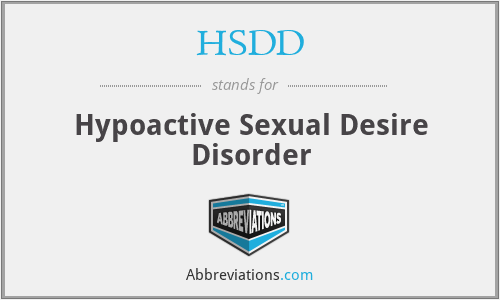What does HSDD mean in Psychology?
This page is about the meanings of the acronym/abbreviation/shorthand HSDD in the Academic & Science field in general and in the Psychology terminology in particular.
Hypoactive Sexual Desire Disorder
Submitted by Dr.Rupayan Talukder on December 11, 2019
Translation
Find a translation for Hypoactive Sexual Desire Disorder in other languages:
Select another language:
- - Select -
- 简体中文 (Chinese - Simplified)
- 繁體中文 (Chinese - Traditional)
- Español (Spanish)
- Esperanto (Esperanto)
- 日本語 (Japanese)
- Português (Portuguese)
- Deutsch (German)
- العربية (Arabic)
- Français (French)
- Русский (Russian)
- ಕನ್ನಡ (Kannada)
- 한국어 (Korean)
- עברית (Hebrew)
- Gaeilge (Irish)
- Українська (Ukrainian)
- اردو (Urdu)
- Magyar (Hungarian)
- मानक हिन्दी (Hindi)
- Indonesia (Indonesian)
- Italiano (Italian)
- தமிழ் (Tamil)
- Türkçe (Turkish)
- తెలుగు (Telugu)
- ภาษาไทย (Thai)
- Tiếng Việt (Vietnamese)
- Čeština (Czech)
- Polski (Polish)
- Bahasa Indonesia (Indonesian)
- Românește (Romanian)
- Nederlands (Dutch)
- Ελληνικά (Greek)
- Latinum (Latin)
- Svenska (Swedish)
- Dansk (Danish)
- Suomi (Finnish)
- فارسی (Persian)
- ייִדיש (Yiddish)
- հայերեն (Armenian)
- Norsk (Norwegian)
- English (English)
Definition
What does HSDD mean?
- Hypoactive sexual desire disorder
- Hypoactive sexual desire disorder (HSDD), hyposexuality or inhibited sexual desire (ISD) is sometimes considered a sexual dysfunction, and is characterized as a lack or absence of sexual fantasies and desire for sexual activity, as judged by a clinician. For this to be regarded as a disorder, it must cause marked distress or interpersonal difficulties and not be better accounted for by another mental disorder, a drug (legal or illegal), or some other medical condition. A person with ISD will not start, or respond to their partner's desire for, sexual activity. HSDD affects approximately 10% of all pre-menopausal women in the United States, or about 6 million women.There are various subtypes. HSDD can be general (general lack of sexual desire) or situational (still has sexual desire but lacks sexual desire for current partner), and it can be acquired (HSDD started after a period of normal sexual functioning) or lifelong (the person has always had no/low sexual desire). In the DSM-5, HSDD was split into male hypoactive sexual desire disorder and female sexual interest/arousal disorder. It was first included in the DSM-III under the name inhibited sexual desire disorder, but the name was changed in the DSM-III-R. Other terms used to describe the phenomenon include sexual aversion and sexual apathy. More informal or colloquial terms are frigidity and frigidness.
Embed
Citation
Use the citation below to add this abbreviation to your bibliography:
Style:MLAChicagoAPA
"HSDD." Abbreviations.com. STANDS4 LLC, 2024. Web. 25 Apr. 2024. <https://www.abbreviations.com/term/2178147>.



Discuss this HSDD abbreviation with the community:
Report Comment
We're doing our best to make sure our content is useful, accurate and safe.
If by any chance you spot an inappropriate comment while navigating through our website please use this form to let us know, and we'll take care of it shortly.
Attachment
You need to be logged in to favorite.
Log In